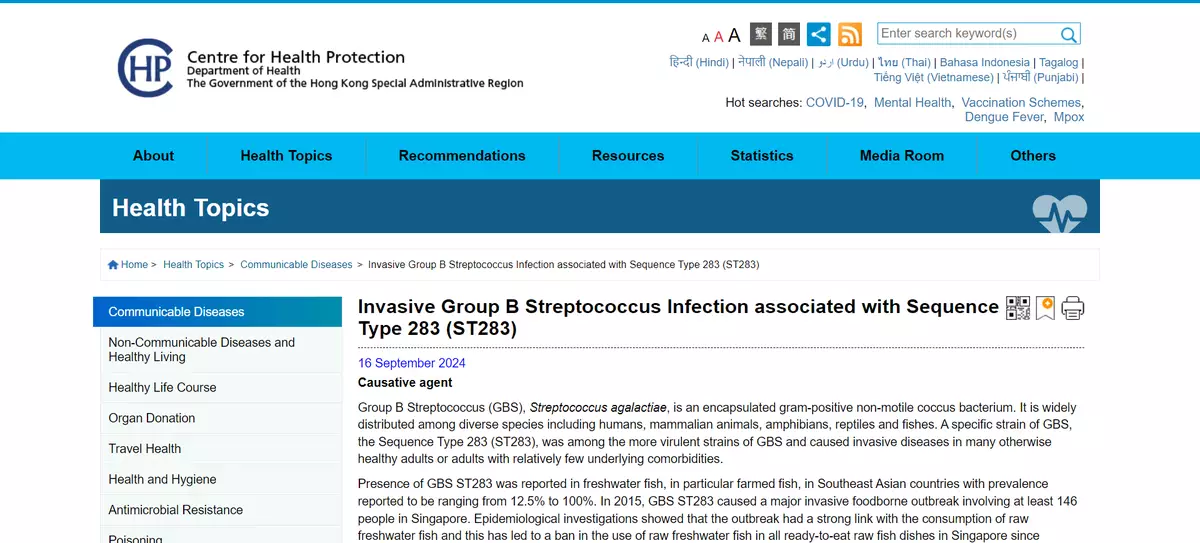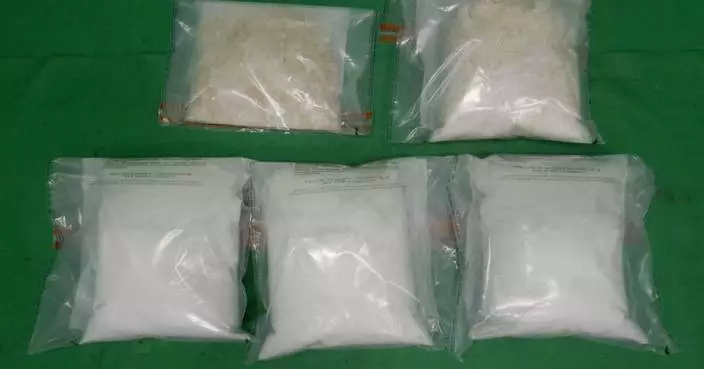CHP updates on latest situation of invasive Group B Streptococcus infection
The Centre for Health Protection (CHP) of the Department of Health today (September 20) continued its investigation into the latest situation of invasive Group B Streptococcus infection. The CHP appealed to members of the public for heightened vigilance and in particular, to pay attention when touching or handling raw freshwater fish. One should wear gloves, as well as not consume undercooked freshwater fish.
The CHP has been closely monitoring the invasive Group B Streptococcus infection cases over the past few weeks and conducted genetic sequencing analysis for patients' specimens to confirm infection number of serotype III sequence type 283 (ST283). The recent surveillance data of hospitals show that the daily number of hospitalised patients confirmed to have invasive Group B Streptococcus infection has stabilised. For ST283 cases, since theannouncements on September 13 and September 16, the CHP today confirmed 30 additional ST283 cases involving patients previously admitted to the hospitals. The patients involved 16 males and 14 females, aged between 36 and 95. The patients mainly presented with sepsis (19 patients) and joint abscess (11 patients). Together with the 40 cases of ST283 infection announced earlier, this cluster involved a cumulative total of 70 patients residing in 18 districts throughout the territory. The onset date of the disease for all 70 patients was before September 10, and 54 of them have underlying illnesses. Among the 70 patients, 19 have been discharged, 45 hospitalised patients are in stable condition, three are in serious condition and the other three with underlying illnesses have passed away.
The CHP's epidemiological investigations revealed that 58 patients have had contact with or handled raw freshwater fish before the onset of symptoms (six of them reported that they had wounds on their hands when handling raw freshwater fish). Eight patients cannot rule out that they have consumed undercooked freshwater fish (not freshwater fish sashimi), and the exposure history of the remaining four patients is under investigation.
While none of the 70 patients were fishmongers or engaged in fish culture-related jobs, two of them are cooks who have handled raw freshwater fish. As the patients resided in various districts throughout the territory, and the freshwater fishes concerned were bought from 36 markets in 16 districts respectively, the CHP considered that the affected freshwater fish may involve the wholesale level. The laboratory analysis of the environmental samples collected by the CHP earlier from the Freshwater Fish Market under the Cheung Sha Wan Wholesale Food Market is still in progress. So far, no abnormality has been observed by the Agriculture, Fisheries and Conservation Department regarding the freshwater fish in the wholesale fish markets.
Moreover, the CHP has conducted medical surveillance on over 1 500 workers and no symptomatic worker has been identified. The Food and Environmental Hygiene Departmenthas strengthened the cleaning and disinfection of the relevant markets.
"Members of the public should wear gloves when touching or handling raw freshwater fish. If symptoms such as an inflamed wound and fever develop, they should seek medical attention promptly. Meanwhile, the public should refrain from consuming undercooked freshwater fish," a spokesman for the CHP reminded.
To prevent Group B Streptococcus (ST283) infection, members of the public are reminded to maintain personal, food and environmental hygiene, and should keep their hands clean and practice good wound care at all times, especially:
The public may visit the CHP'sInvasive Group B Streptococcus Infection associated with Sequence Type 283 (ST283)page for more information.
CHP reminds public on precautions against cold weather
The Centre for Health Protection (CHP) of the Department of Health (DH) today (December 22) reminded the public, particularly the elderly and people with chronic illnesses, to adopt appropriate measures to protect their health in view of the cold weather.
A spokesman for the CHP said that cold weather can easily trigger or exacerbate diseases, especially among the elderly and persons suffering from heart disease, respiratory illnesses or other chronic illnesses.
"Elderly people have less insulating fat beneath their skin to keep them warm, and their body temperature control mechanisms may be weaker. Their body may not be able to appropriately respond to thecold weather," the spokesman said.
Some senior persons may have decreased mobility, which can impair their ability to generate and conserve body heat. Chronic illnesses, such as hypertension, diabetes and endocrine disorders, may undermine the health of elderly people and lower their metabolic rate, subsequently causing their body to generate less heat. Persons with chronic illnesses, such as chronic respiratory illnesses or heart disease, are vulnerable to disease aggravation due to cold weather.
The CHP reminded the public, in particular the elderly and persons with chronic illnesses, to adopt the following preventive measures:
Take note of the weather forecast. Wear warm clothing, including hats, scarves, gloves and socks, accordingly;
Consume sufficient food to ensure adequate calorie intake;
Perform regular exercise to facilitate blood circulation and heat production;
Stay in a warm environment and avoid prolonged outdoor exposure;
Use heaters with care and maintain adequate indoor ventilation; and
Seek medical advice if feeling unwell.
In addition, the public should avoid alcoholic beverages.
"Drinking alcohol cannot keep you warm. Alcohol accelerates the loss of body heat through dilated blood vessels, resulting in chilling instead," the spokesman said.
"Parents should ensure that babies are sufficiently warm, but it is also important to keep babies relatively lightly clothed to avoid overheating them," the spokesman added.
Parents should observe the following safety measures when putting their children to bed:
Keep the room well ventilated and at a comfortable temperature;
Always place babies on their backs to sleep. Leave their heads, faces and arms uncovered during sleep;
Babies do not need pillows. Place babies on a firm and well-fitted mattress to sleep. Avoid soft objects, pillows and loose bedding;
Let babies sleep in a cot placed near their parents' bed; and
Maintain a smoke-free environment.
In addition, many respiratory pathogens, including influenza and SARS-CoV-2, may have increasing activity and community transmission during winter. Seasonal influenza vaccination is recommended for all persons aged 6 months or above, except those with known contraindications. Persons at higher risk of getting influenza and its complications, including the elderly and children, should receive seasonal influenza vaccinations early. Please see details of the vaccination schemes on theCHP's website.
A person who gets influenza and COVID-19 at the same time may be more seriously ill and would have a higher risk of death. It is important for elderly persons, especially those residing in residential care homes, to receive both a seasonal influenza vaccination and a COVID-19 vaccination. They should also receive an additional booster against COVID-19 according to recommendations as soon as possible. The public should also maintain good personal and environmental hygiene against respiratory illnesses and note the following:
Surgical masks can prevent transmission of respiratory viruses from ill persons. It is essential for persons who are symptomatic (even if having mild symptoms) to wear a surgical mask;
Wear a surgical mask when taking public transport or staying in crowded places. It is important to wear a mask properly, including performing hand hygiene before wearing and after removing a mask;
Avoid touching one's eyes, mouth and nose;
Wash hands with liquid soap and water properly whenever possibly contaminated;
When hands are not visibly soiled, clean them with 70 to 80 per cent alcohol-based handrub;
Cover the mouth and nose with tissue paper when sneezing or coughing. Dispose of soiled tissue paper properly into a lidded rubbish bin and wash hands thoroughly afterwards;
Maintain good indoor ventilation;
When having respiratory symptoms, wear a surgical mask, refrain from work or attending classes at school, avoid going to crowded places and seek medical advice promptly; and
Maintain a balanced diet, exercise regularly, take adequate rest, do not smoke and avoid overstress.
Food-borne diseases, particularly those linked to hotpot cuisine, are also common in cold weather. The following preventive measures should be taken:
Wash hands before handling and consuming food;
Do not patronise unlicensed vendors or those with poor hygienic standards while selecting food;
Wash and cook all food thoroughly;
Vegetables should be washed thoroughly in clean running water before cooking and consumption. When appropriate, scrub vegetables with hard surfaces with a clean brush to remove dirt and substances, including pesticide residues and contaminants, from surfaces and crevices;
Shrimps should be fully cooked until the shells turn red and the flesh turns white and opaque;
For shellfish such as scallops and geoduck, scrub the shells thoroughly and remove internal organs;
Do not eat any undercooked freshwater aquatic products. To ensure that the food is thoroughly cooked, the centre of the food should reach a temperature of at least 75 degrees Celsius so as to destroy pathogen;
Most hotpot ingredients should be stored in a refrigerator at 4 degrees C or below, while frozen food should be stored in a freezer at -18 degrees C or below;
Never use raw eggs as a dipping sauce for hotpot; and
Use different sets of chopsticks to handle raw and cooked food to avoid cross-contamination.
In addition, when using fuel-burning appliances, especially in indoor areas, the public should ensure adequate ventilation to avoid harmful exposure to carbon monoxide (CO) and prevent CO poisoning.
For more health information, the public may call the DH's Health Education Infoline (2833 0111) or visit theCHP's websiteandFacebook Fanpage.
The public may also call Dial-a-Weather (1878 200) or visit thewebsite of the Hong Kong Observatoryfor the latest weather information and forecasts, or itspage on Weather Information for Senior Citizens.








